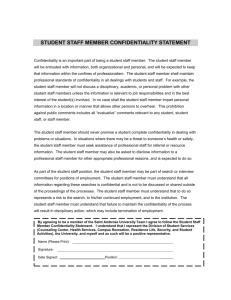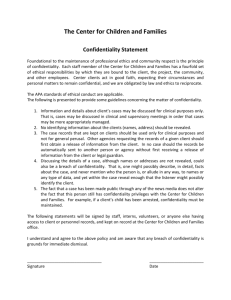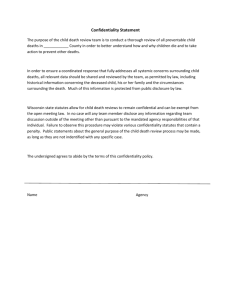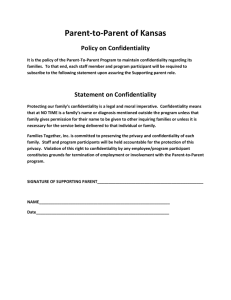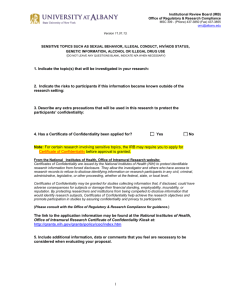Brochure - Student-Teacher Confidentiality
advertisement
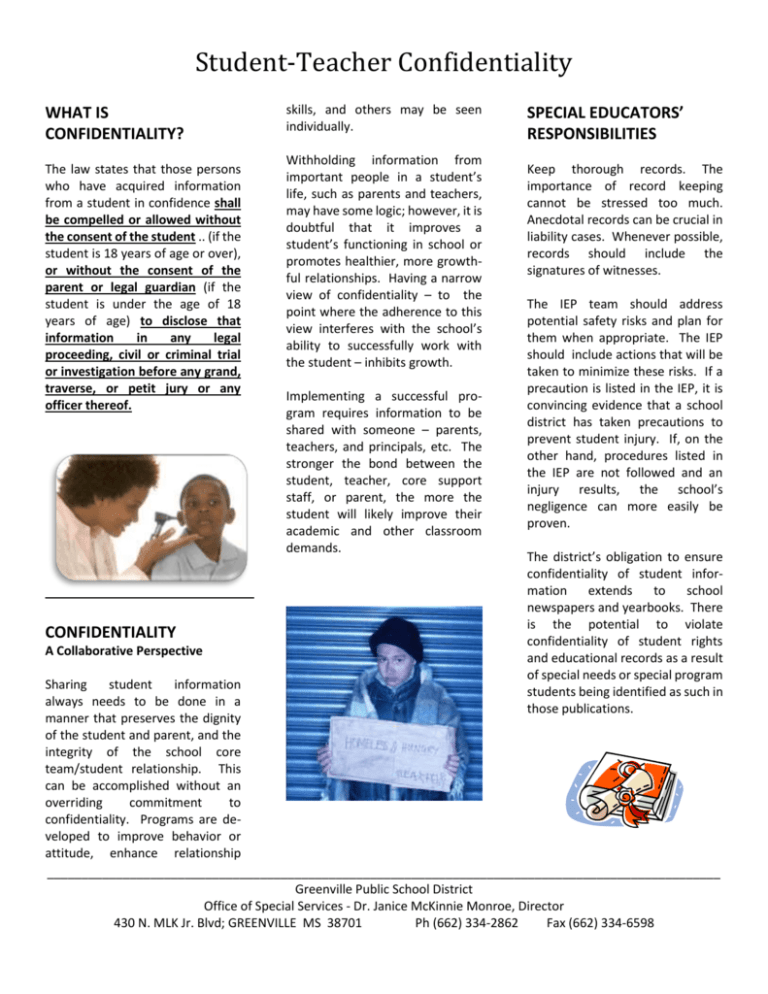
Student-Teacher Confidentiality WHAT IS CONFIDENTIALITY? The law states that those persons who have acquired information from a student in confidence shall be compelled or allowed without the consent of the student .. (if the student is 18 years of age or over), or without the consent of the parent or legal guardian (if the student is under the age of 18 years of age) to disclose that information in any legal proceeding, civil or criminal trial or investigation before any grand, traverse, or petit jury or any officer thereof. CONFIDENTIALITY A Collaborative Perspective skills, and others may be seen individually. Withholding information from important people in a student’s life, such as parents and teachers, may have some logic; however, it is doubtful that it improves a student’s functioning in school or promotes healthier, more growthful relationships. Having a narrow view of confidentiality – to the point where the adherence to this view interferes with the school’s ability to successfully work with the student – inhibits growth. Implementing a successful program requires information to be shared with someone – parents, teachers, and principals, etc. The stronger the bond between the student, teacher, core support staff, or parent, the more the student will likely improve their academic and other classroom demands. SPECIAL EDUCATORS’ RESPONSIBILITIES Keep thorough records. The importance of record keeping cannot be stressed too much. Anecdotal records can be crucial in liability cases. Whenever possible, records should include the signatures of witnesses. The IEP team should address potential safety risks and plan for them when appropriate. The IEP should include actions that will be taken to minimize these risks. If a precaution is listed in the IEP, it is convincing evidence that a school district has taken precautions to prevent student injury. If, on the other hand, procedures listed in the IEP are not followed and an injury results, the school’s negligence can more easily be proven. The district’s obligation to ensure confidentiality of student information extends to school newspapers and yearbooks. There is the potential to violate confidentiality of student rights and educational records as a result of special needs or special program students being identified as such in those publications. Sharing student information always needs to be done in a manner that preserves the dignity of the student and parent, and the integrity of the school core team/student relationship. This can be accomplished without an overriding commitment to confidentiality. Programs are developed to improve behavior or attitude, enhance relationship __________________________________________________________________________________________________ Greenville Public School District Office of Special Services - Dr. Janice McKinnie Monroe, Director 430 N. MLK Jr. Blvd; GREENVILLE MS 38701 Ph (662) 334-2862 Fax (662) 334-6598 Student-Teacher Confidentiality ACCESS TO SPECIAL EDUCATION RECORDS Special Service directors, social workers, case managers, office managers and secretaries, school psychologists and psychometrists, special education teachers, speech pathologists, nurses, instructional strategists and State Department personnel are the only ones to have access to the special education records of the students in special services. Each folder has an access sheet which lists the people who have viewed the folder. TERMINOLOGY Student records do not include Informal notes compiled by a school officer or employee which remain in the sole possession of the maker, are used only as a personal memory aid, and are not accessible or revealed to any other person except a substitute teacher; or Records of a law enforcement unit of the district. Mandatory permanent student records are those records which are maintained in perpetuity and which schools have been directed to compile by state law, regulation or administrative directive. Mandatory interim student records are those records which the schools are directed to compile and maintain for stipu-lated periods of time and are then destroyed in accordance with state law, regulation or admini-strative directive. Permitted student records are those records having clear importance only to the current educational process of the student. request to release a copy of any record. Disclosure means to permit access to or the release, transfer, or other communication of person-ally identifiable information contained in education records, to any party, by any means, including oral, written, or electronic. Personally identifiable information includes, but is not limited to, the student’s name, the name of the student’s parent/guardian or other family member, the address of the student or student’s family, a personal identifier such as the student’s photo, social security number or student number, and a list of personal characteristics or other information that would make the student’s identity easily traceable. Adult student is a person who is or was enrolled in school and who is at least 18 years of age. School officials and employees are officials or employees whose duties and responsibilities to the district, whether routine or as a result of special circumstances, require that they have access to student records. Access means a personal inspection and review of a record, an accurate copy of a record, or receipt of an accurate copy of a record, an oral description or communication of a record, and a __________________________________________________________________________________________________ Greenville Public School District Office of Special Services - Dr. Janice McKinnie Monroe, Director 430 N. MLK Jr. Blvd; GREENVILLE MS 38701 Ph (662) 334-2862 Fax (662) 334-6598



